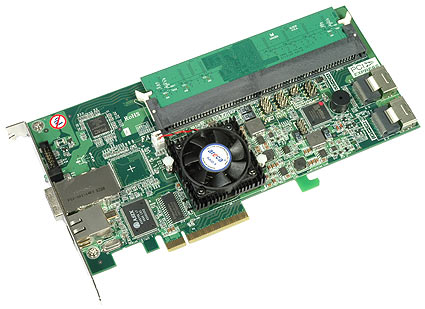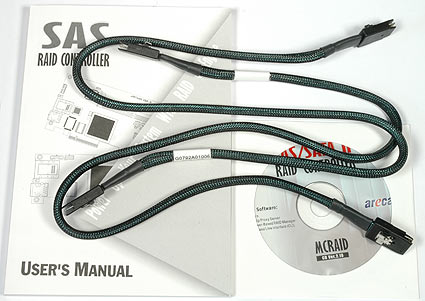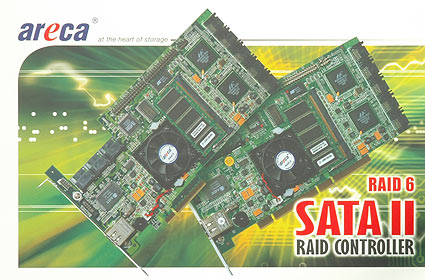AMCC, Areca & LSI Serial RAID Controllers
Areca ARC-1680ML
Areca’s ARC-1680ML is equipped with an Ethernet port, which can be used to manage and configure the card without having to install the management software. The card can accommodate an entire Web server and grabs an IP address if your network has DHCP support. And as sad as this sounds, this option saved us during the tests, as the management software did not work properly on two different test systems. At the same time, older Areca software versions, which consist of a server and a client, threw errors and crashed. We were able to launch the current version, but it did not refresh any information, which prevented us from creating a RAID array or update the Firmware. A bug-fixed version of Areca’s RAID Storage Manger should fix these issues quickly. Thanks to the Web configuration client, we were able to access the card this way and set it up for our testing.
Areca offers two cards with SAS support: The ARC-1680 for PCI Express x8 and the ARC-1681 for PCI-X. There are three PCI Express cards for low-profile applications: the 1680LP, 1680i and 1680x. The first one has one internal and one external multi-lane port, "i" has two internal and "x" has two external multi-lane ports. These ports consist of four 300 MB/s ports, but can be spread out using SAS expanders. All cards are equipped with Intel’s 800 MHz IOP348 for XOR calculation.
Areca offers a 240-pin DDR2 DIMM slot, which accepts any ECC memory between 512 MB and 2 GB. However, the low-profile cards come with 256 MB integrated DDR2-533 ECC memory and cannot be upgraded. Areca underlines the support for multiple storage adapters, which makes it possible to span RAID arrays across more than one controller for large-capacity or high-performance requirements. Like the other vendors, Areca offers an optional battery backup unit (BBU).
The features include Online Capacity Expansion and RAID Level Migration, support for arrays greater than 2 TB and an enclosure management through SES 2.0 and SGPIO. Areca supports more RAID options than most of the others; you can run RAID 0, 1, 1+,0 3, 5, 6 and nested RAID 30, 50 and 60 as well as JBOD. You can configure multiple RAID arrays on one or multiple Areca controllers. Drives are automatically assigned to their arrays - no matter which port you use to plug it in (though this feature has become common, it’s still worth mentioning it).
At a deeper queue depth of more than eight commands, performance doesn’t increase anymore (while it should).. Since it uses Intel’s latest XOR engine, it should be capable of delivering better performance at large command queue depths. We thus suggest that you wait for new firmware and software versions, since the hardware will definitely be capable of providing excellent performance after the remaining bugs are fixed.
Get Tom's Hardware's best news and in-depth reviews, straight to your inbox.

Patrick Schmid was the editor-in-chief for Tom's Hardware from 2005 to 2006. He wrote numerous articles on a wide range of hardware topics, including storage, CPUs, and system builds.


